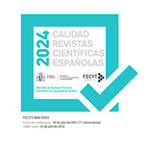The Roman Goddess Fortune, Meaning and Survival in the Work of Rubens
Abstract
The Roman goddess Fortuna represented the personification of luck, chance or destiny. That was the sense that persisted in memory and customs throughout history. After the advent of Christianity, Pagan customs and some of their divinities changed their meaning, adapting to the new realities. Fortune was transformed into Providence governed by the one God. We contemplate this evolution through different examples of different times: two statues of Fortuna Dea, in classic time, located into the funds of the Prado Museum; a medieval painting of the Wheel of Fortune originally from the Town Hall of Alcañiz (Teruel); several Renaissance works by different authors (Previtali, Bellini, Durero); a classicist work of Reni; another pre-Raphaelite example of Burne-Jones; and finally a Baroque work of Rubens located at the Prado Museum.
Downloads
Article download
License
In order to support the global exchange of knowledge, the journal Eikon Imago is allowing unrestricted access to its content as from its publication in this electronic edition, and as such it is an open-access journal. The originals published in this journal are the property of the Complutense University of Madrid and any reproduction thereof in full or in part must cite the source. All content is distributed under a Creative Commons Attribution 4.0 use and distribution licence (CC BY 4.0). This circumstance must be expressly stated in these terms where necessary. You can view the summary and the complete legal text of the licence.











